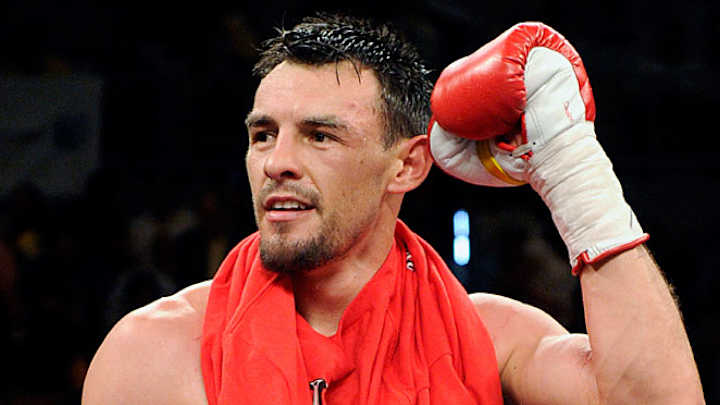Robert Guerrero chose the worst state to bring a gun to

Pro athletes and New York's tough gun laws haven't been a good mix of late.
Plaxico Burress served 20 months in prison after he accidentally shot himself in a New York City nightclub. He opted to plead guilty in part because he had no viable defenses for possessing a gun in New York without a license.
WBC welterweight champion Robert Guerrero, who is set to challenge Floyd Mayweather Jr. on May 4 for the welterweight title, might be in a similar dilemma. After entering John F. Kennedy Airport in Queens early Thursday morning to catch a flight, he reportedly showed a locked gun box to a Delta Airlines ticket agent. The box allegedly contained an unloaded pistol and three unloaded high-capacity bullet magazines. Guerrero was then charged by New York authorities with four felonies, which carry a possible penalty of four years in a prison.
Some reports indicate Guerrero possesses a valid license to carry the weapons in his state of residence, California. But New York law is clear and unforgiving: a person must be licensed by the state of New York to carry weapons in New York. Neither Guerrero being unaware of New York law, nor him believing a California firearms' license would (like a California driver's license) reciprocally work in New York constitutes a viable defense.
Worse yet for Guerrero, he faces significant time in prison if convicted on the charges. While we have not heard Guerrero's side of the story, he would almost certainly be convicted if he owns the guns or knowingly possessed them. The available information -- including a police report -- strongly indicates they are his guns.
Guerrero may be able to convince prosecutors to let him "plead out" to lesser charges. This is especially possible if he lacks a criminal record (a search by SI.com found none in New York), convincingly explains it was an innocent mistake, and seems genuinely apologetic for an act that harmed no one. Aiding Guerrero, it does not appear he acted suspiciously or attempted to conceal the weapons. Just the contrary, he is portrayed as voluntarily showing the gun box to the Delta Airlines ticket agent.
But as Burress and other defendants have discovered, New York is probably the worst state to make an "innocent" gun mistake. Earlier this year, New York enacted the New York Secure Ammunition and Firearms Enforcement Act, which ratcheted up the penalties for unlawful possession of a firearm. New York City Mayor Michael Bloomberg, whose jurisdiction includes Queens, is also one of the nation's most prominent critics of guns and has fought for higher restrictions and sanctions. Plus, if prosecutors want to make an example out of a defendant in order to send a message to the public, a high-profile one like Guerrero would fit the bill. Assuming Guerrero admits fault, expect prosecutors to grill him on why he found it advisable or necessary to travel with guns, especially on air plane, and demand that he explains to the public what he was thinking. The charges he faces, in other words, will not go away quietly.
The one good piece of news for Guerrero, who hasn't lost a fight since 2006 and at age 30 is considered in the prime of his career, is that his title fight on May 4 will likely go as planned. A report by ESPN.com states Guerrero's first court hearing will occur May 14. Should Guerrero enter talks with prosecutors for a plea deal, he may not appear before a judge until the summer. Any sentencing would not happen until after a pre-sentencing report is compiled, a process that would take several weeks.
Still, Guerrero faces serious criminal charges that could take the fighter out of the ring for a significant period of time. He could also lose endorsement income if sponsored companies drop him under morals clauses in their contracts with him. This is one bout that he won't win by knockout.
Michael McCann is director of the Sports and Entertainment Law Institute at the University of New Hampshire School of Law and the distinguished visiting Hall of Fame Professor of Law at Mississippi College School of Law. He also directs the sports law program at Vermont Law School.

Michael McCann is a legal analyst and writer for Sports Illustrated and the founding director of the Sports and Entertainment Law Institute (SELI) at the University of New Hampshire School of Law, where he is also a tenured professor of law.